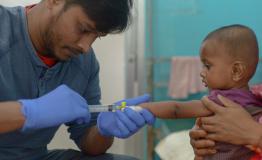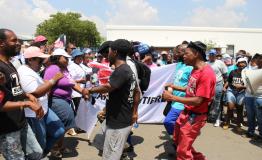

Bangladesh
Rohingya refugees and vulnerable communities in urban slums remain the focus of our projects in the country.

10,000,000
10,000,
568,400
568,4
27,400
27,4
3,870
3,87
Cox's Bazar
In 2020, MSF ran 12 facilities in Cox’s Bazar district, offering healthcare to both Rohingya and host communities. In three of these facilities, we set up dedicated isolation and treatment centres for severe acute respiratory tract infections. In six others, we adapted areas to treat potential COVID-19 patients. Movement restrictions and other measures imposed by the authorities because of the pandemic reduced the presence of humanitarian workers and disrupted access to healthcare for Rohingya and Bangladeshi communities.
The movement restrictions also led to increased challenges for the community, humanitarian organisations and the authorities. MSF observed a sustained drop of around 50 per cent in outpatient consultations and a similar decrease in the number of refugees arriving with acute respiratory tract problems. This indicated that patients with COVID-19-related symptoms were not comfortable seeking care.
The restrictions, the need for staffing of COVID-19-related activities, as well as the protection of staff members from infection, forced us to scale down routine vaccinations and community surveillance, and completely suspend other activities, such as regular outreach, community engagement and hygiene promotion, as only Rohingya volunteers were allowed to raise awareness of health issues inside the camps.
We supported public efforts to reduce transmission risks and our teams distributed nearly 300,000 face masks in Ukhiya.

Rohingya refugees in Bangladesh three years after their exodus
Abu Siddik is from Rakhine state in Myanmar. He now lives in a refugee camp in Cox’s Bazar with his two daughters, three sons, and his wife. In the photo, he is at the MSF Kutupalong hospital with his five-year-old son Rashid Ullah, who is recovering from some wounds.
Kamrangirchar
MSF runs two urban clinics in Kamrangirchar district in the capital, Dhaka, where we provide reproductive healthcare and medical and psychological treatment for sexual and gender-based violence. We also provide occupational health services, which include treatment for workers diagnosed with occupational diseases, as well as preventive care and risk assessment in factories.
Our medical assistance is tailored to the needs of people working in extremely hazardous conditions. In 2020, our teams conducted almost 5,000 consultations for factory workers. Additionally, our mobile clinics brought healthcare – including tetanus vaccinations – to tannery workers in Savar subdistrict.
No. staff in 2020: 1,982 (FTE) » Expenditure in 2020: €32.9 million MSF first worked in the country: 1985


MSF and TB activists disrupt opening of TB conference to protest drug corporations keeping life-saving medicines from people

Tips to De-Stress

Gavi should stop awarding special funds to Pfizer and GSK for pneumonia vaccine
![June 2018: A group of Rohingya refugees await assignment to their new homes in in the Kutupalong camp, Cox's Bazar. [© Pablo Tosco/Angular ] June 2018: A group of Rohingya refugees await assignment to their new homes in in the Kutupalong camp, Cox's Bazar. [© Pablo Tosco/Angular ]](/sites/default/files/styles/card_half/public/msf235448_medium.jpg?itok=REEQMAms)
The Rohingya in Bangladesh: “The population has been completely suspended in time”
![Metun (name changed on request) is a Rohingya refugee in the Kutupalong-Balukhali megacamp in Cox’s Bazar, Bangladesh [ © Dalila Mahdawi/MSF ] Metun (name changed on request) is a Rohingya refugee in the Kutupalong-Balukhali megacamp in Cox’s Bazar, Bangladesh [ © Dalila Mahdawi/MSF ]](/sites/default/files/styles/card_half/public/msfimages/news/msf280669_medium.jpg?itok=DDp3fsU8)